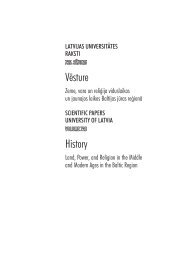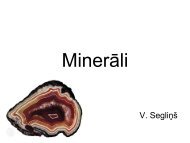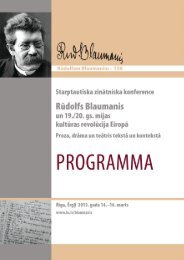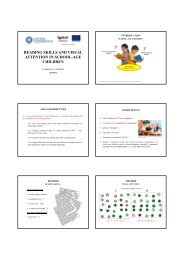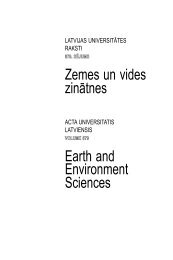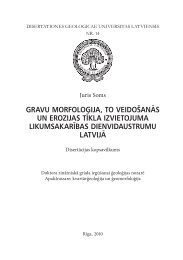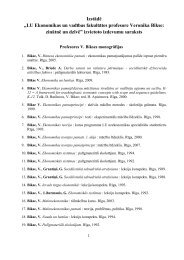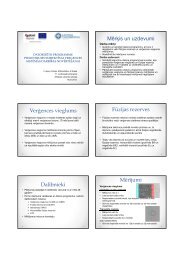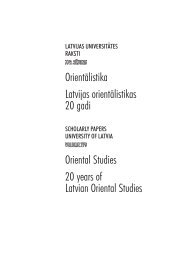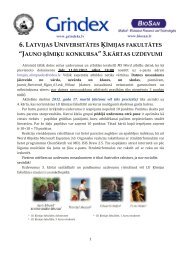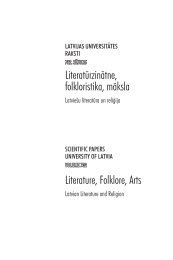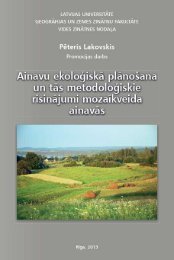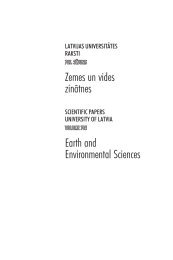Latgalistikys kongresu materiali, III. 2011. - Latvijas Universitāte
Latgalistikys kongresu materiali, III. 2011. - Latvijas Universitāte
Latgalistikys kongresu materiali, III. 2011. - Latvijas Universitāte
Create successful ePaper yourself
Turn your PDF publications into a flip-book with our unique Google optimized e-Paper software.
LTdz 1952 — A. Švābe, K. Straubergs, E. Hauzenberga-Šturma. Latviešu tautas<br />
dziesmas (Chansons populaires lettonnes). I–XII sēj. Kopenhāgena, 1952–1956.<br />
SAPRGE 2008 — Puču i vaļsts volūda latgaliski. Piektdiena, 4. jūlijs (2008) 13:18<br />
(Skatīta versija: http://diena.lv/lat/tautas_balss/blog/saprge/pucu-voludalatgaliski<br />
(12.01.2011))<br />
VA 2009 — I. Šuplinska, S. Lazdiņa (red.). Valodas Austrumlatvijā: pētījuma dati un<br />
rezultāti. („Via Latgalica“ pielikums 1). Rēzekne, 2009.<br />
VPSV 2007 — Valodniecības pamatterminu skaidrojošā vārdnīca. Rīga, 2007.<br />
Де-Вос 2001 — Дж. Де-Воc. Этнический плюрализм: конфликт и адаптация //<br />
Личность, культура, этнос. Современная психологическая антропология.<br />
Москва, 2001. — c. 14–23.<br />
Жинкин 1958 — Н. Жинкин. Механизмы речи. Москва, 1958.<br />
Марченко 1996 ― Е. Марченко; Э. Архангельская. Лингвистический анализ<br />
текста. Даугавпилс, 1996.<br />
Степанов 1994 — Ю. Степанов. Слово. Из статьи для словаря концептов («Концептуария»)<br />
русской культуры // Philologica 1 (1994) (Skatīta versija:<br />
http://www.rvb.ru/philologica/01/01stepanov.htm (01.02.2011)).<br />
Тайлор 2000 ― Э. Тайлор Миф и обряд в первобытной культуре. Смоленск,<br />
2000. — 624 с.<br />
Фрезер 2001 ― Дж. Фрезер. Золотая ветвь: Исследование магии и религии: I–II.<br />
Москва, 2001.<br />
Ци 2010 — В. Ци. Эволюция концептов язык — речь — слово в русской филологической<br />
традиции: Исторический аспект. Москва, 2010.<br />
Semantic Modifications of Language and Speech in Latgalian Fairytales<br />
In the discourse of contemporary science, culture and mass media, language is<br />
recognized to be one of the most essential elements of one’s ethnic identity. The aim<br />
of the research is to identify the most ancient collective layers of linguistic<br />
understanding by revealing the semantic context of language and speech in Latgalian<br />
fairytales. For this purpose a linguistic-culturological method has been chosen which<br />
focuses on language and speech as concepts which cover their paradigmatic,<br />
syntagmatic and word-formation relations. Fairytales as a genre of oral folklore<br />
reveal a broad and semantically diverse context of language and speech. In the<br />
relation between language and speech preference is given to expressions of speech<br />
which relate to the frequency of their use and their functional application. In<br />
fairytales, language has not become a symbol of ethnic self-awareness yet, but it<br />
functions within the fundamental mythological paradigm as an element<br />
differentiating one’s “own” and an “alien” world. The understanding of language is<br />
broadened by lexical synonyms which acquire independent levels of understanding<br />
based on mythological traditions in the individual context. It also has additional<br />
functions in the course of the plot and with regard to the typology of characters.<br />
Verbal expressions of speech reveal an understanding of speech and an amplitude of<br />
its application implemented both at the cognitive and the emotional levels.<br />
129



